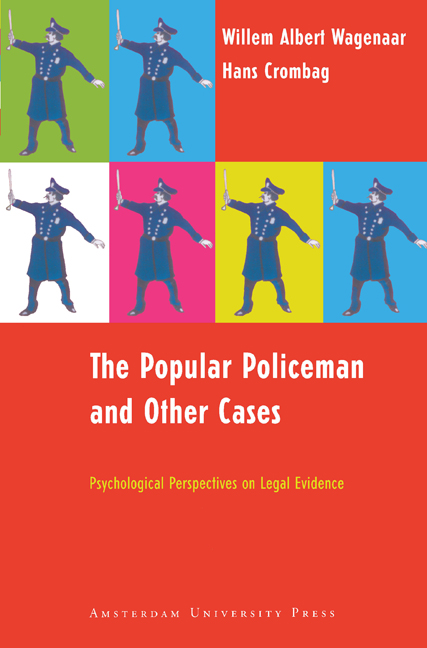Book contents
- Frontmatter
- Contents
- Foreword
- 1 Illegal Gambling or the Victory Travel Club
- 2 On Causal Reasoning or Death in the Warmoesstraat
- 3 Consumer Confusion or Potato Chips and Olive Oil
- 4 Fiction and Reality of ‘the Average Individual’ or the Case of Old Mr. Lane
- 5 Case Histories and Scientific Proof or the Case of JR
- 6 Not a Good Story or the Disappearance of Maddy and Vicky
- 7 Conflicting Scenarios or the Case of the Man who Needed a Companion
- 8 Two Processes Obstructing the Accuracy of Long-Term Memory or the Case of the Stolen Mercedes
- 9 Confessions after Repeated Interrogation or the Putten Murder Case
- 10 Collaborative Storytelling or the Artist’s Models and an Angry Neighbourhood
- 11 Allegation of Sexual Child Abuse in a Case of Disputed Visitation or Cindy's Story
- 12 Psychogenic Amnesia or the Case of the Amnesic Strangler
- 13 Obeying Reflexes or Death on the Climbing Wall
- 14 Visual Acuity or Shooting Mimi the Cat
- 15 Sexual Semiotics or the Case of the Popular Policeman
- Postscript: Psychological Expertise and the Law
- Bibliography
- Name Index
- Subject Index
12 - Psychogenic Amnesia or the Case of the Amnesic Strangler
Published online by Cambridge University Press: 16 February 2021
- Frontmatter
- Contents
- Foreword
- 1 Illegal Gambling or the Victory Travel Club
- 2 On Causal Reasoning or Death in the Warmoesstraat
- 3 Consumer Confusion or Potato Chips and Olive Oil
- 4 Fiction and Reality of ‘the Average Individual’ or the Case of Old Mr. Lane
- 5 Case Histories and Scientific Proof or the Case of JR
- 6 Not a Good Story or the Disappearance of Maddy and Vicky
- 7 Conflicting Scenarios or the Case of the Man who Needed a Companion
- 8 Two Processes Obstructing the Accuracy of Long-Term Memory or the Case of the Stolen Mercedes
- 9 Confessions after Repeated Interrogation or the Putten Murder Case
- 10 Collaborative Storytelling or the Artist’s Models and an Angry Neighbourhood
- 11 Allegation of Sexual Child Abuse in a Case of Disputed Visitation or Cindy's Story
- 12 Psychogenic Amnesia or the Case of the Amnesic Strangler
- 13 Obeying Reflexes or Death on the Climbing Wall
- 14 Visual Acuity or Shooting Mimi the Cat
- 15 Sexual Semiotics or the Case of the Popular Policeman
- Postscript: Psychological Expertise and the Law
- Bibliography
- Name Index
- Subject Index
Summary
The case of the amnesic strangler
On 6 June 2002 the District Court in the Dutch city of Assen acquitted Oscar Baarsma (a pseudonym) of murdering his wife Edith, although there was no doubt that Edith had died from strangulation by her husband. They had had a very bad marriage, and Edith had decided that a divorce was inevitable. Oscar disagreed, and he refused to move out of the house or to cooperate in the divorce proceedings. Oscar and Edith quarrelled almost constantly, and sometimes these quarrels became very nasty indeed. On one of these occasions Edith threatened to accuse Oscar of sexually molesting their daughter. At that point, according to Oscar, ‘his ears began to ring’, he ‘began to sweat heavily and became very hot. The light went out of my eyes,’ he said, ‘and there was total darkness. And then there was nothing at all.’ When sometime later he came to his senses, he found himself sitting on the floor next to Edith, his hands loosely around her neck. She was dead, and Oscar had no memory at all of what he had obviously done. He said he felt terribly guilty, but he had no explanation for his behaviour other than that this time Edith had apparently gone too far. But since he had no memory of what had happened, he did not know precisely how and why he had strangled her.
Before the case went to court, three expert witnesses, two psychiatrists and a psychologist, examined Oscar. Each of these experts had two meetings with Oscar, after which they conferred amongst themselves and came to agree that although Oscar had no psychiatric history and also at present appeared to be free of any psychiatric symptom, at the time of the incident he must have suffered from an ‘acute dissociative disorder’ of brief duration, during which he had had ‘no cognitive control’ over his actions and could therefore not be held responsible for them. Since in their examination the experts had found no indication for any other psychiatric disorder of a more permanent nature, they judged the chance of recidivism low. And that is how the District Court, adopting the opinions of the experts, came to dismiss the case and sent Oscar home a free man.
- Type
- Chapter
- Information
- The Popular Policeman and Other CasesPsychological Perspectives on Legal Evidence, pp. 195 - 210Publisher: Amsterdam University PressPrint publication year: 2012



